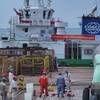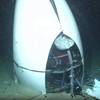With resolution of the DD(X) bid protest, Northrop Grumman is on track to complete the DD(X) system design and associated engineering development models (EDM) by 2005.
The scope and complexity of the design work, which includes development and integration of new hull and ship systems as well as advanced combat systems, is unprecedented for a U.S. Navy surface combatant. Northrop Grumman is responsible for the total ship system design, as well as development and testing of 11 EDMs.
While the DD(X) system design work is proceeding, the EDMs will be built and tested in parallel for key systems such as the integrated power system (IPS), the advanced gun system (AGS) and an integrated radar suite.
Land-based and selected at-sea testing of the EDMs will be performed with the results engineered into the total ship system design. A second shipbuilder, Bath Iron Works, will perform DD(X) design and test activities as a subcontractor to Northrop Grumman, thus ensuring that both shipbuilders can compete on an equal basis for the next contractual phase.
Other critical systems undergoing development and testing include the following:
- Integrated deckhouse and apertures (to be enclosed in a composite superstructure);
- A peripheral vertical launch system (to be located on the perimeter of the ship’s hull for better ship survivability);
- An integrated undersea warfare system that integrates both an advanced towed array and high-frequency active sonar for antisubmarine and mine warfare missions;
- The total ship computing environment.
Several units within NAVSEA will support the DD(X) design agent. NAVSEA’s Naval Surface Warfare and Naval Undersea Warfare Centers, along with selected university laboratories, are providing key support to Northrop Grumman for system design and EDM work.
For example, DD(X) hull-form development and testing will be performed at NAVSEA’s Naval Surface Warfare Center Carderock facility. Land-based testing of the IPS and radar suite is taking place at NAVSEA’s Philadelphia and Wallops Island, Md., facilities.
The transition to this transformational surface warship will be made by means of spiral development. Instead of trying to achieve all the DD(X) operational requirements with the lead ship, this evolutionary process allows for requirements to be met in incremental stages with lower technical risk.
Source: Naval Sea Systems Command Public Affairs
Sponsored Content
The Future of the Advanced Measurement Industry: A Vision of Precision, Safety, and Reliability

August 2025
 Read the Magazine
Read the Magazine

 Read the Magazine
Read the Magazine
This issue sponsored by:

By the Numbers: Mitigating Maritime Risk: Inside AWO’s Falls Overboard Prevention Report
Subscribe for
Maritime Reporter E-News
Maritime Reporter E-News is the maritime industry's largest circulation and most authoritative ENews Service, delivered to your Email five times per week








